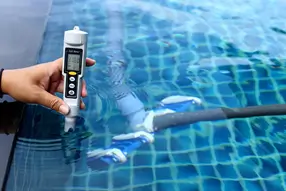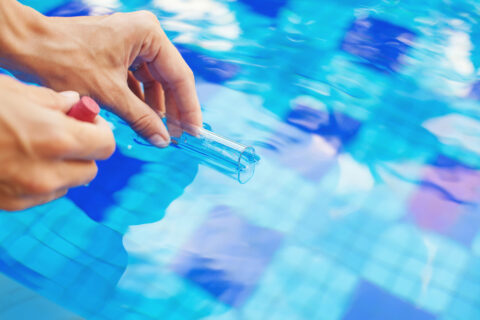Common Problems with Salt Cells & How to Troubleshoot Solutions
Saltwater pools are increasingly popular for their gentle water, reduced need for traditional chlorine, and overall easier maintenance. However, like anything else, they require maintenance. One critical component of a saltwater pool system is the salt cell, which converts salt into chlorine. When problems arise, effective salt cell troubleshooting can save you from having water quality issues. Here’s a guide to common problems with salt cells and how to troubleshoot solutions.
Salt Cell Troubleshooting Basics
The salt cell, also known as a salt chlorinator, is an important component of a saltwater pool system. It generates chlorine through an electrolysis process, keeping the pool water sanitized. Understanding the common problems and maintenance tips can help you keep your pool in tip-top shape.
Common signs that there is an issue with your salt cell include:
- Low Chlorine Levels: Despite running your salt system as usual, the chlorine levels in the pool remain low or zero.

- “Check Salt” or “Inspect Cell” Warnings: The control panel displays warnings such as “Check Salt,” “Inspect Cell,” or other error codes indicating a problem.
- Visible Scale or Debris: A buildup of white, chalky scale or debris on the salt cell plates.
- Poor Water Quality: Cloudy water, algae growth, or an unusual odor, indicating the pool is not being adequately sanitized.
- Fluctuating Salt Levels: Inconsistent or fluctuating salt levels in the pool water despite regular maintenance.
- Reduced Water Flow: An obvious decrease in water flow, often due to blockages or scaling within the cell.
- Corrosion or Damage: Physical damage or corrosion on the cell or its connectors.
- Power Issues: The salt cell or control panel does not turn on or frequently shuts down unexpectedly.
If you notice any of these signs, it’s important to troubleshoot and address the issues swiftly to maintain the effectiveness of your saltwater pool system.
Chlorine Production Issues
One of the most frequent saltwater chlorinator problems is inadequate chlorine production. If your pool water chlorine levels are lower than expected, it could be due to several factors:
- Insufficient Salt Levels: Ensure the salt concentration in the pool is within the recommended range. Most systems require 2700-3400 ppm (parts per million). The owner’s manual for your unit will specify the required range.
- Dirty Salt Cell: Calcium buildup on the cell plates can impact performance. Regular cleaning of the salt cell is essential.
- Faulty Cell: Over time, salt cells can wear out and need replacement. Check the manufacturer’s recommendations for the lifespan of your cell.
Inadequate Flow in Salt System
Proper water flow is crucial for the salt cell to function correctly. Inadequate flow can trigger alerts and hinder chlorine production. Causes include:
- Clogged Filters: Ensure the pool’s filters are clean and free of debris.
- Pump Issues: Verify that the pool pump is working correctly and maintaining adequate pressure.
- Blocked Skimmers: Remove any blockages from skimmers and return jets to ensure unrestricted water flow.
Addressing Specific Saltwater Chlorinator Problems
Certain issues may arise with saltwater chlorinators that require specific attention:
- Corrosion: Saltwater can be corrosive. Ensure all metal components in contact with the water are suitable for saltwater use.
- Power Issues: Verify that the power supply to the chlorinator is stable and that all connections are secure.
- Sensor Malfunctions: Flow and salt sensors can sometimes give false readings. Cleaning or replacing these sensors can restore accurate readings.
Salt Chlorinator Maintenance Tips
Routine maintenance of your salt chlorinator can prevent many common problems. Key practices include:
- Weekly Testing: Regularly test the pool water for chlorine levels, pH, and salt concentration.
- Cell Cleaning: Remove the salt cell and clean it using a mild acid solution to dissolve calcium deposits. This should be done every 3-6 months. The owner’s manual for your unit will provide the proper mixture of this solution.
- System Inspection: Check the entire salt system, including the control unit and flow sensor, for any signs of wear or malfunction.
- DIY Salt Chlorinator Repair: While some issues can be fixed through DIY methods, don’t hesitate to contact a professional for more complicated issues.
Pool Water Sanitization Techniques
Maintaining a saltwater pool involves more than just managing the salt chlorinator. Other sanitization techniques include:
- Shock Treatments: Weekly shock treatments to the pool to oxidize any accumulated contaminants.
- Algaecides: Use algaecides as needed to prevent algae growth.
- Balancing Chemicals: Maintain balanced pH and alkalinity levels to support effective chlorine production and overall water quality.
Keep Your Pool in Top Condition
Proper salt cell troubleshooting and maintenance are important for ensuring your saltwater pool remains a safe and enjoyable environment. Regular inspections, cleaning, and understanding common problems can help you avoid expensive repairs while extending the lifespan of your salt system. Keeping your pool water chlorine levels stable and your system running smoothly ensures a clean, clear, and inviting pool all season long.
Design Your New Pool with All Seasons Pools & Spas, Inc.
Since 1954, All Seasons Pools & Spas, Inc. has stood as a beacon of quality and commitment in the pool industry. Founded by Gene and Claudia Mayhall, the company has grown from a small home-based operation to a nationally recognized leader, embodying the principles of excellence and customer care. Today, All Seasons continues to serve Orland Park, IL, offering top-notch products and services, from patio and deck work to Hayward salt system maintenance, to ensure your pool remains inviting year-round. Join the legacy of satisfied customers who have discovered the unmatched dedication and expertise of All Seasons Pools & Spas, Inc. Contact us online, visit our online store, or give us a call at 708-349-2222 and experience the best in pool design, construction, and maintenance.


